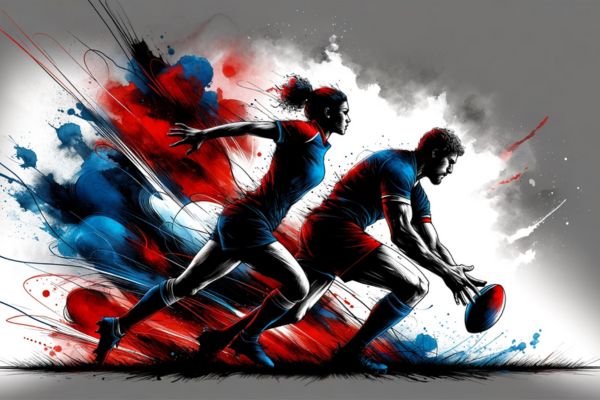What Businesses Can Learn From Teamwork in Sport
Just like triumphant sports teams, businesses thrive when individuals work together towards a common goal, leveraging each other’s strengths and supporting one another in order to succeed. By understanding how a sport’s team can excel, gives organisations valuable insights on how they too can build a winning team. We asked Scottish International rugby players Duncan Hodge and Sandra Colamartino, to draw on their own experiences in sport to understand what makes a cohesive team and how this facilitates success and growth.
Success in sport is only achieved because of great teamwork
Sandra and Duncan played for Scotland’s International Rugby Union teams and have both been hailed national heroes for scoring all the points in each of their respective winning matches. But as they point out, these were not individual achievements; they were only achievable because of the strength of the whole team. Neither could have completed their winning tries unless the skills and support of the team were in place.
Sandra gives an example, “ultimately, the touching down of my try was based on us getting into the right position. It was the team that got us near the line in the 1st place and so everyone in that squad scored that try, it was pure teamwork.”
There is no individual glory when scoring the winning tries, it is the result of having the best team in place and all working together. But how do you build team loyalty in the first place?
Building a strong culture is a good place to start
Culture can be described as a set of observable behaviours and is basically the way things get done. Everyone influences the culture, but leaders have a disproportionate influence on the culture, because they are role models. Leaders set the culture by their own actions, such as being punctual to meetings, responding to emails quickly, making communication calm and composed.
Sport coaches are leaders and therefore influence the culture of a team. Duncan’s role as rugby coach believes that keeping the culture simple is key. “The best teams I’ve ever worked in was nailing down just three core values… i.e honesty; respect; being on time, so people knew exactly what was expected and was referred to regularly to reinforce these values.”
Interestingly, there is no one rule on what builds a strong culture, it can just be what is important to that individual team, as Duncan continues to explain, “Working as coach for Fiji, it was like nothing else I’d ever experienced. These guys just loved each other and got up in the morning, smiles on faces and were just such good mates. Therefore, their three things were: friendship; religion; fun.”
Culture dictates the way things get done, which impacts communication, working relationships, team cohesion, performance and ultimately results and by having a culture that is positive and supportive, ensures individuals feel valued, respected and motivated.
Understanding that different skillsets make up a team
Growing a business means building a team and inevitably you will have employees with very different skillsets. So there needs to be a balance on recognising and celebrating the USP of each individual and being able to delegate in a way that taps into different talents and specific skills, but you also need them to buy into the bigger picture and shared goals. This can be done by encouraging collaboration, making sure each person is valued in the team for things that they bring.
It is no different in rugby as Sandra describes, “You’ve got your big bruising forwards that you need to push really heavy things and then you need someone to have a bit of speed, it’s exactly the same, it’s just a different form. I think anyone who has played sport knows about compromising, and can look at the bigger picture of the greater good and everything is related to working as a team.”
If you have loners then it’s harder to create a cohesive group, so it’s important to have strong leadership so people understand that everyone is important to the team. This is where specific learning strategies can help build unified teams. By supporting leaders and equipping them with the right range of skills such as coaching, how to motivate employees and delegate effectively, will give employees a sense of belonging and feel part of the team.
Picking the right team might not always seem fair
Having the best team in your business is imperative because you can’t have people who aren’t good enough, so sometimes you need to be quite harsh. It goes back to how it will affect the whole team if the wrong person is in the role.
These difficult decisions are made frequently in sport, when there are fine margins of a player being very, very good and incredible. Sandra explains, “ I think sport is so unfair as you can have someone who’s trained by the boot, they’ve done every single training session and they don’t make the team. At times it feels really unfair. Ultimately you have to hand it over to someone else that’s better for the team.”
This comes back to shared goals and always keeping in mind what the overall objective is, which if every member of the team buys in to, people will understand that a decision is made for a reason and good for the whole group.
Dealing with team conflict
Inevitably, within a team there will sometimes be conflict. This can manifest itself for a number of reasons such as a clash of resources, pressures, territory or ego. And often that comes from someone’s personality rather than anything else. It takes a particular skill set to deal with team conflict and problem solving and using practical tools and techniques can help support management to address issues to ensure the right outcomes are achieved.
In sport there are always players with big personalities and egos that can cause rifts within the team, so how did Duncan deal with this as a coach? “Imagine there’s an issue, you lose a game, that issue gets bigger very quickly, so it needs to be dealt with quickly, but not too quickly. Firstly, I confirm if there’s a problem or not and then if it is a problem, approach those individuals, identify what the problem is and flush it out. Because if you don’t, that problem gets bigger very, very quickly and then it can get out of control.”
Dealing with it before it festers and grows is key before it creates a new problem. It’s also important to be mindful by trying to find out the facts of the situation and ensure it’s not just hearsay. By reminding individuals to spend a moment to remember why we’re all here, what we’re trying to achieve and that we’re all part of one team, can diffuse the situation. Try and take a collaborative approach where everyone’s perspective and needs are recognised, encourage good listening and then agree what the common ground is and what the best possible way forward would be.
Remote working doesn’t exist in team sports, is this a good thing?
You can’t play a team sport remotely from your own home, so meeting everyday means bonding is made easier. So, can you still build a motivated and loyal team when employees are working in virtual environments, where people may be less engaged in the business and may be less clear on what they’re trying to achieve?
Running her own business, Sandra knows firsthand how hybrid working can be detrimental to a successful team and believes employee interaction is key to building a strong culture. “I think we’ve got a lot of benefits from remote teams, but without a doubt you have to take the time to be together to make connections.”
Not meeting in person means it can be difficult for leaders to be aware of any problems that may exist. It’s important therefore to become aware of virtual behaviours i.e. do they look engaged, are they listening intently and are they giving out positive signals? These skills may not necessarily have been developed by your management team, as the transition to virtual working has happened rapidly. But by highlighting what skills are needed to support employees working virtually, you can then tailor your learning programme to overcome these challenges such as, how to keep up face to face communication and how to keep track of behaviour to ensure a team member is ok. This level of personal care keeps strong connections which is vitally important in order to mirror the comradery that exists within sports teams who meet day in day out.
As Sandra adds, “I’ve got your back is what makes a good team in sport. You need that in an organisation too when you might make a big mistake. You need someone to come up and say I’ve got your back. And if you really know someone, you’ll want to support them. Therefore, they can’t just be a face in a little box on the screen. They have to meet and take the time to connect in person.”
Ultimate goal – make everyone feel important
As we’ve seen, businesses can learn a great deal from sports teams and how to build a winning team. It’s about encouragement, praise, good coaching, giving feedback, dealing with conflict and ultimately making it personal. It’s not a one size fits all strategy, it’s about personalising treatment, really getting to know individuals and what they bring to the team. It’s important to realise that no matter what role a person plays in the team, you need to treat everyone the same and create a culture where everyone feels valued and wants to achieve the same goals. Tailored leadership and management learning solutions are a good place to start to enhance individual performance and develop the unique skills required to build a strong culture that is crucial to develop a high-performing team.
This can then create a ‘squad mentality’ which is vital, as Sandra concludes, “In sport, having that feeling of a squad mentality whether you’re on the subs bench or you’re the star player, like Finn Russell. If Finn gets injured, the next player coming on to replace him can save the day and therefore that player is as critical to that team’s performance as Finn. So, when you look at your own team, think of every single member of your squad being as critical and as important.”
Explore insights from our recent leadership breakfast and join the conversation by contacting us here.



